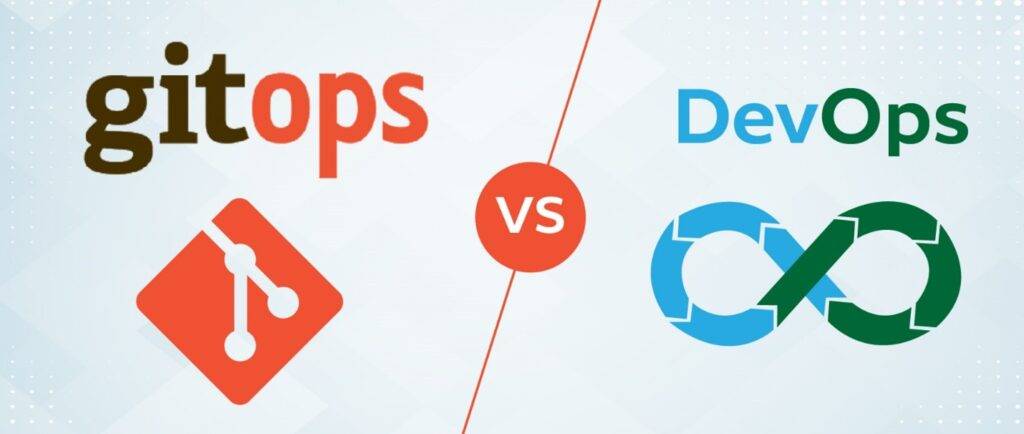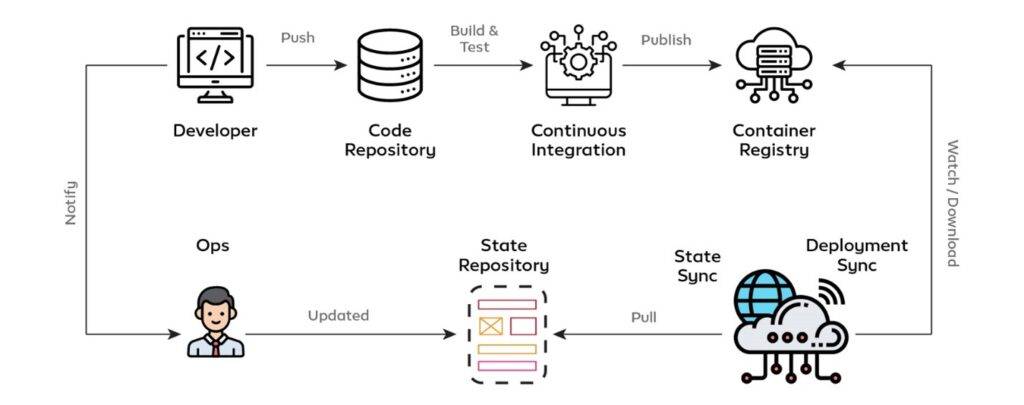- April 19, 2023
- Posted by: Indium
- Category: Application Engineering

The software development model has been continuously evolving over the decades, with the traditional waterfall process slowly being replaced by the agile DevOps model. This evolution is happening because of a conscious shift towards creating faster time-to-market, addressing errors early, and the need for easier software management. The DevOps model enables better collaboration between the operations and development teams, eliminates silos, and automates the development process with continuous improvement.
Having said that, the next stage in software development model evolution is already here – in the form of GitOps. As cloud-native app development gains popularity, there is a greater need for simplifying cloud infrastructure management. GitOps uses Git, an open-source version control system (VCS), for application and infrastructure configuration management and thrives on the DevOps ecosystem and culture.
Today, both GitOps and DevOps are facilitating collaboration between development and ops teams and making the development process more efficient. Where they differ is in the approach to achieving this goal. Git provides developers with a unified view of the source code. It stores all changes in a central location, which enables easy auditing and tracking of any modifications to the system. For example, with Git, it’s easy to track application updates and infrastructure configurations. Git also allows teams to revert to an earlier commit without compromising on quality. It ensures continuous delivery, deployment, and version control of applications as well as infrastructure as code and deployments.
GitOps can be used independently or as an extension of DevOps. Incorporating Git in the DevOps software delivery process improves the orchestration of projects, enabling efficient and reliable development and delivery of software applications.
For instance, Deutsche Telekom, a multinational telco group that has more than 220,000 employees working across offices in 50 countries, built a multi-site, multicluster, multi-infrastructure, Kubernetes engine using open-source technologies. It manages several hundred clusters by combining GitOps and the declarative system with Kubernetes. This allows scaling up based on need faster and at no additional cost.
Read this insightful article on the Top 5 Tools for API Integration in Modern Cloud-Based Applications.
GitOps vs DevOps

Some of the key differences between GitOps and DevOps are:
DevOps focuses on automation and GitOps on version control.
DevOps engineers use Jenkins as the primary tool for continuous integration and delivery. Sometimes they use it with Ansible and Chef. GitOps engineers use Git. Sometimes they also use Kubernetes for making changes. GitOps offers the following advantages:
- Code branching and merging becomes easier.
- A large variety of third-party integrations is possible.
- It helps with version control.
Deployment correctness is manual in DevOps and automated in Git
In DevOps, while the operations team manages the infrastructure and deploys the code, the development team ensures correctness of the deployments. In GitOps, declarative configuration files stored in Git repositories automate the verification and check for correctness before deployment. This also improves the accuracy of the application. As a result, the risk of errors is less and in case of errors, rollback is possible. Of course, Git repository management requires technical expertise and organization.
Git comes with version control and eliminates manual intervention.
Git enables version control, which simplifies automation as it allows the code and configuration to be pushed directly from the system to the production environment. This accelerates deployment while eliminating the risk of errors due to manual intervention.
Managing Infrastructure Code: DevOps vs GitOps
DevOps follows declarative and prescriptive approaches to operations. Therefore, it can be used for models of monolithic applications or those with limited componentization. DevOps monitors, configures, and manages infrastructure as a code for solving problems around infrastructure changes, such as during modernization.
GitOps, on the other hand, uses a declarative approach and is becoming popular for managing modern cloud infrastructure. When developing containerized applications, it optimizes CI/CD on Kubernetes and accelerates deployment. For DevOps teams familiar with Kubernetes, using GitOps pipelines is easy and needs minimal changes to the existing workflows for automated software delivery.
6 More Reasons Why GitOps is Great
While it improves the delivery cycle and software efficiency, Git is not without its challenges. Git requires highly technical skills to manage and maintain the software. If the changes are not merged or managed properly, it can result in data loss. It also requires the development and operations teams to collaborate more closely, which can be challenging in a large organization.
Having said that, there are many benefits of incorporating the GitOps approach to software development.
- Businesses can become more agile and responsive to customer needs as it accelerates production time, feature management, and updating of Kubernetes.
- With Git Repo, tasks such as pull requests for the Continuous Deployment and Continuous Integration (CI/CD) pipelines can be made reproducible.
- It improves efficiency of workflows through end-to-end standardization and automation.
- GitOps improves stability and reliability by providing audit logs that help validate changes.
- Its robust cryptography ensures the security of the environment, reduces downtime, and improves response times to incidents.
GitOps Use Cases
GitOps can be used in a variety of scenarios, such as,
- Slicing Networks: GitOps can be used to lower costs by allowing service providers to slice service tiers and letting users pay according to bandwidth usage.
- Documentation and Writing: VCS such as GitHub or bitbucket can be used to store ASCII docs. They can be used for product documentation or other writing projects. It even enables checking grammar and spelling and the document can be converted to any format such as doc, PDF, or ePUB.
- Editing for Static Websites: GitOps simplifies the editing of complex markdown files in static websites.
Indium for GitOps Approach
Indium is a data engineering, software development, and quality assurance company with vast experience in DevOps and automation. Our team of experienced developers works closely with our customers to create bespoke solutions that accelerate development and break barriers to innovation. Our developers have the necessary qualifications and expertise in GitOps, DevOps, Kubernetes, Jenkins, and other tools needed to create the right architecture and solutions for our customers based on their goals and needs.
To know more about our capabilities
Visit Us

